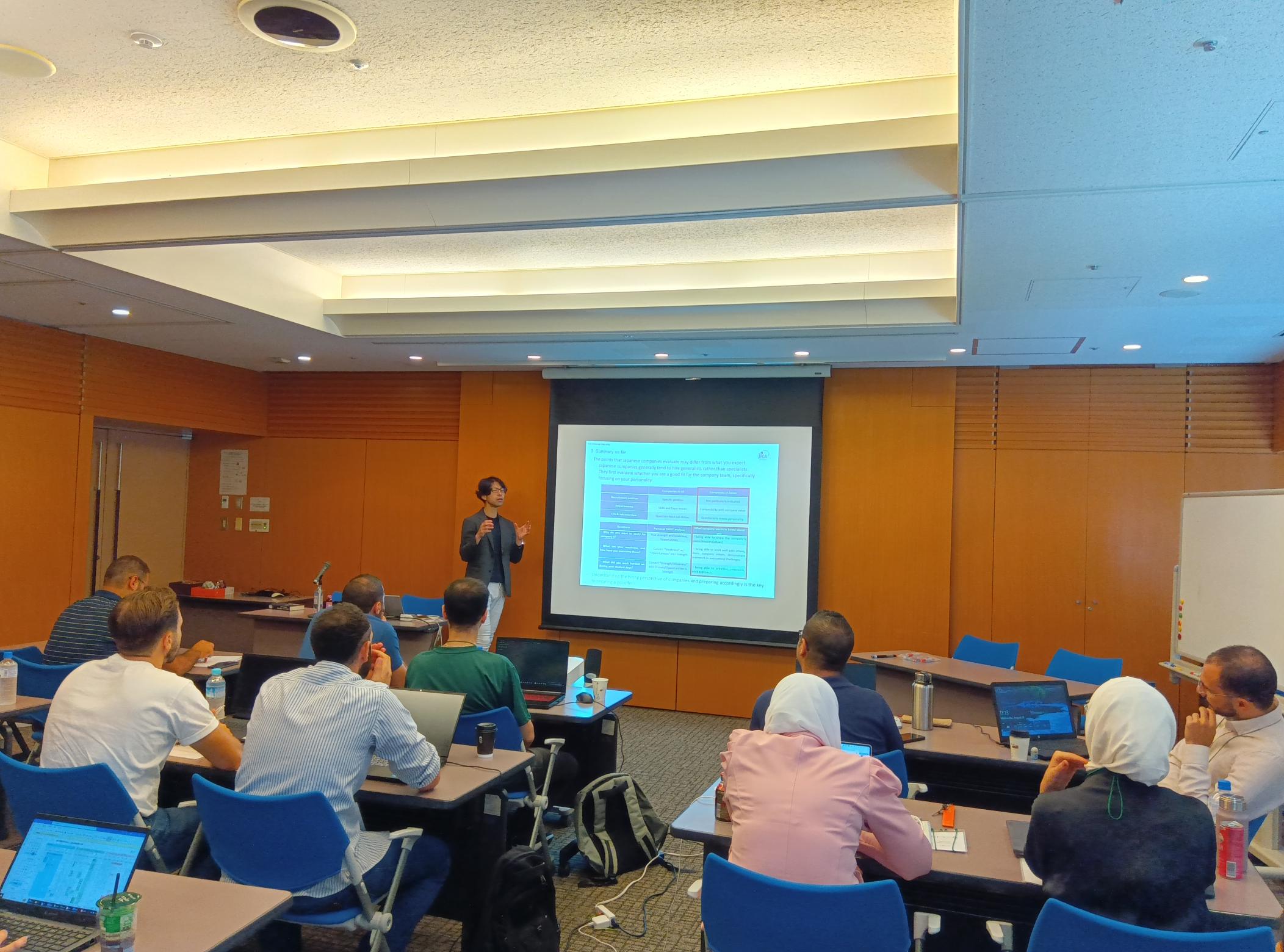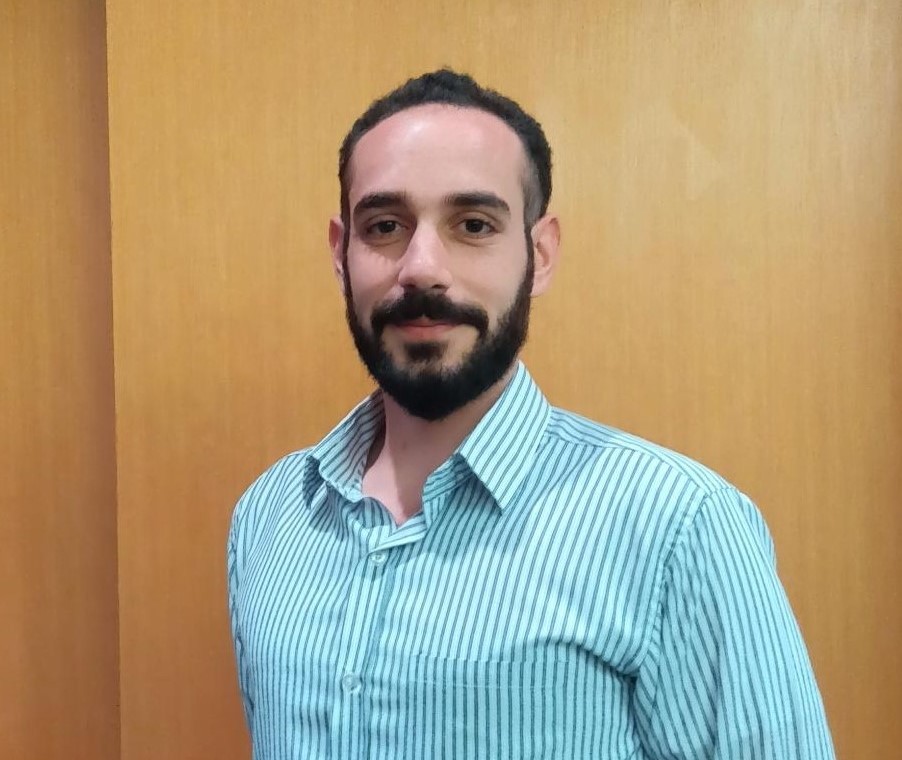The Japanese Initiative for the Future of Syrian Refugees (JISR) provides employment and internship support to JISR participants who wish to find employment in Japan after completing their master's degree. As Japanese job search system is very unique, there is a lot for international students to learn and prepare for. JISR participants work hard to find employment while studying Japanese and conducting academic research at the university.
Employment Support Program
For three days from August 27 to 29, 2024, an employment support program was held for JISR participants who were about to start their job search. After receiving Japanese language training for about 8 months after arriving in Japan, JISR participants will move on to their master's degree programs. Since many JISR participants will be looking for jobs as recent graduates, they will begin their job search while still studying in order to receive a job offer from a company. This is a common practice in Japan, but in other countries, there is no such custom of hiring graduates in bulk, and it is more common for companies to advertise jobs as they arise throughout the year according to their needs. For this reason, in most overseas countries, the job search often begins after graduation, and this unique Japanese system of receiving job offers while still a student is a custom that is difficult for JISR students to understand. In addition to the recruitment schedule, there are also many JISR students who are confused by the difference between the recruitment system in Japan (membership-type employment), where the content of work and the place of work after joining the company are not decided at the time of recruitment, and the recruitment system in other countries (job-type employment), which is based on work in specialized fields.
This employment support program helps participants deepen their understanding of Japan's unique hiring process, and also provides practical job search support at an early stage before moving on to master’s degree programs. This includes learning how to write an entry sheet and resume, conducting a SWOT analysis*1 to identify one's strengths and weaknesses, learning how to use the PREP method*2 to give clear and concise answers in job interviews, learning about business etiquette and corporate practices in Japan, listening to the experiences of previous participants, and conducting mock interviews.
- * 1: The SWOT analysis is a method of identifying and analyzing the Strengths, Weaknesses, Opportunities, and Threats of a given subject.
- * 2: The PREP method is a technique for communicating things to others in a way that is easy to understand. It uses the Point - Reason - Example - Point structure.
The JISR participants who attended the program gave positive feedback, such as, “I'm so glad I learned how to fill out the entry sheet,” “I learned how to approach the job search in stages even though my Japanese isn't perfect,” “I discovered my strengths and weaknesses through SWOT analysis,” and “I was able to learn about interview etiquette and how to prepare for interviews.”

JISR participants listened attentively to the lecture.
Internship
The JISR program also supports internships. This allows participants to gain a deeper understanding of Japanese companies and the nature of their work. This time we interviewed JISR participant Mr.Mohammad. He shared his impressions of participating in an internship.
Q. Please tell us about your internship work and what you thought of it.
A. I participated in a two-week internship at SATAKE CORPORATION (Hiroshima Prefecture). It was my first internship, and I had the opportunity to learn a lot from the first day to the last. The company mainly manufactures and sells processing machinery and food products related to rice and other grains. I was able to participate in development work using 3D software to make parts for the rice milling machine. I think I was able to make use of both my previous experience as a mechanical engineering student and my current studies in IT in the master’s degree program.
Q. What did you learn through your internship?
A. During my internship, I had the opportunity to learn about the history of the company, and I was surprised to know that it was founded in 1896 and has a long tradition. In terms of products and services, I learned not only about the rice milling machines, but also about a product called "Magic Rice", which can be stored for a long time and eaten as porridge or rice. I also learned about the organizational structure of the company and was shown how the various departments are organized and how the work is divided. Thanks to the internship, I was able to experience the corporate environment directly through things like the morning radio exercises, and I was able to deepen my understanding of what it is like to work in Japan. Since I spoke almost all the time in Japanese during the internship, I was also able to learn new technical terms related to machinery.
Q. How do you plan to make use of your internship experience?
A. Before the internship, I didn't really have a clear picture of what it would be like to work in a Japanese company, but this experience has helped me become clearer about what kind of work I would like to do in the future. I have become interested in mechanical design and engineering, so my job search options after graduation have expanded. From now on, I would like to think more specifically about how I would like to work and use this experience in my job search.

Mr. Mohammad shared his experiences in an interview.
In this way, internships not only help JISR participants understand Japanese corporate culture, but also help them gain a clearer understanding of their own aptitudes, strengths and areas of interest. This will also be useful when they start looking for a job later on, as it will help them better understand the companies they are applying to, and consider whether the work content and working style of the company matches their own desires, and which of their strengths they could make use of.
JICA will continue to actively support as many JISR participants as possible to find the job they want and to connect them with companies that are a good match for them.




scroll